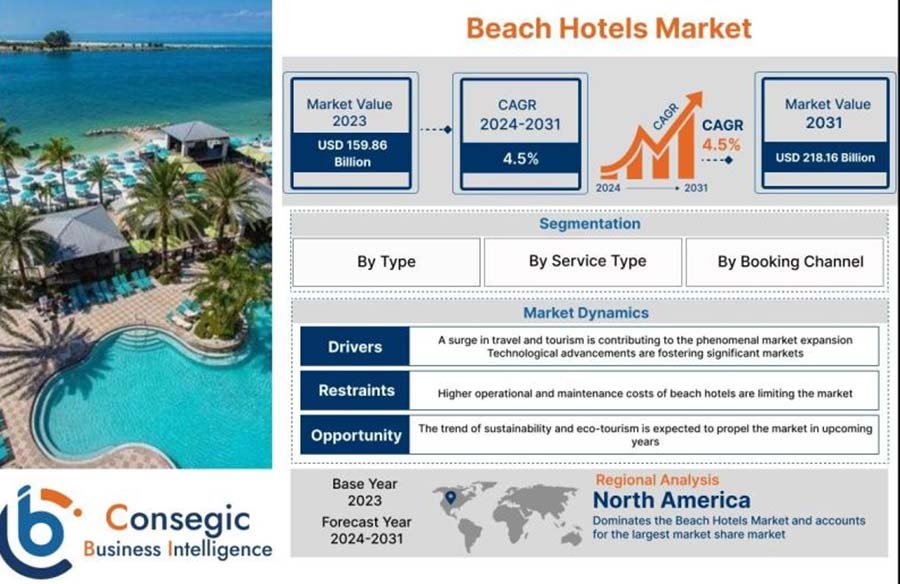Beach Hotels: Investment Appeal, Profitability, and Emerging Destinations

The global beach hotel market reached $159.86 billion in 2023 and is projected to grow to $218.16 billion by 2031, according to Consegic Business Intelligence. The expansion is fueled by digitalization in bookings, rising disposable income, and growing demand for beach vacations among millennials and Gen Z travelers.
Beach hotels encompass all hospitality properties located in coastal zones, providing accommodation and leisure services. The segment includes standard and luxury hotels, all-inclusive resorts, restaurants, bars, SPAs, and entertainment venues, as well as facilities for weddings, conferences, and corporate retreats. These establishments play a key role in coastal economies, creating jobs and attracting investment.
Market Methodology and Structure
Analysts identify several defining features.
By hotel type: standard hotels offer basic amenities, while luxury properties generate the majority of revenue through premium pricing and exclusive services.
By service type: accommodation, dining, all-inclusive packages, events, and add-on experiences such as wellness programs, sports, and excursions.
Booking channels are also crucial. Traditional offline agencies are being replaced by online platforms and direct hotel websites. Experts note that digital transformation—from CRM systems and mobile apps to AI and virtual reality integration—is driving growth by providing convenience and personalization.
Growth Drivers and Market Trends
Key factors behind market expansion include rising incomes, infrastructure development, and government initiatives promoting tourism. Millennials and Gen Z increasingly prefer experiential travel, seeking authentic cultural immersion and unique coastal destinations.
Major global trends include:
Personalized services: tailored guest experiences through data-driven insights.
Sustainable development: eco-friendly operations, local sourcing, and water and energy conservation.
Technological integration: mobile check-ins, smart room controls, and VR tours.
Wellness tourism: a focus on health, fitness, and nutrition programs.
Mobile platforms are becoming a central sales channel, shifting marketing strategies and distribution models.
Challenges and Barriers
Despite steady expansion, the beach hotel sector faces obstacles such as high coastal property costs, seasonality, and strict environmental regulations. Competition from short-term rentals and boutique hotels adds further pressure, while economic volatility and geopolitical risks can affect tourist flows.
To mitigate these risks, hotel groups implement flexible pricing, diversify target audiences, and develop promotional packages. Climate-related challenges—like erosion and rising sea levels—require sustainable adaptation strategies.
Regional Insights
Market dynamics vary by geography:
North America shows stable demand for luxury coastal resorts.
Europe remains a major hub thanks to its cultural and transportation diversity.
Asia-Pacific exhibits the fastest growth, driven by middle-class expansion.
Latin America and Africa are emerging destinations attracting international investment.
One of the fastest-developing hubs is Georgia, which is actively building infrastructure for Black Sea tourism. Projects in Batumi and Gonio are part of a long-term strategy to transform the region into a competitive coastal destination.
Key Players and Investment Trends
Leading global brands include Wyndham Hotel Group, IHG, Marriott, Accor, Hilton, Hyatt, Jumeirah, Belmond, Mandarin Oriental, and Royal Cliff Hotels Group. These operators are investing in digitalization, ESG compliance, and new market entry strategies.
According to CBRE, branded hotels outperform independents with up to 30% higher RevPAR growth. Between 2013 and 2023, the number of brands within a typical brand family rose from 13 to 25, underscoring diversification and brand synergy.
Global hotel investment volume reached $15.9 billion in 2024, up 16% year-on-year, with the EMEA region leading at $8.1 billion (+28%). Investors increasingly prefer value-add assets and network-affiliated projects, which ensure higher operational stability.
Luxury Hotel Brands in Georgia
The transformation of Georgia’s Black Sea coast into a premium resort destination is exemplified by Wyndham Grand Residences Batumi Gonio
— a landmark project in the emerging Gonio coastal cluster.
Why it matters:
Global recognition and standards: “Wyndham Grand” ensures consistent quality, safety, and sustainability.
Stronger distribution and loyalty systems: Access to global booking networks and loyalty programs broadens the tourist base.
Premium leisure formats: Spa, wellness, and beach experiences aligned with personalization trends.
Regional synergy: Proximity to Batumi’s infrastructure reduces seasonality and boosts attractiveness.
Professional management: International operating standards enhance revenue stability and investor confidence.
For guests and investors:
- Upper-upscale/ luxury resort living, smart hospitality technologies, family-friendly amenities, and ESG integration — all defining features of the next-generation coastal lifestyle in Georgia.
- The presence of global hotel brands strengthens Georgia’s position in the premium tourism segment, increases average spending per visitor, and attracts cross-sectoral investments in dining, retail, and events.
Outlook to 2031
Experts expect continued market expansion driven by digital innovation, sustainable tourism, and service personalization. Eco-conscious travel and technological convenience will remain key success factors, while luxury coastal properties are set to outperform due to growing global demand for experiential stays.
By 2031, beach hotels will remain a core pillar of the global hospitality industry, combining investment appeal, environmental responsibility, and evolving traveler expectations.
Подсказки: beach hotels, investment, Georgia, Batumi, Wyndham, hospitality, tourism, real estate, wellness, luxury resorts








